

Talking To Students: What Do You Think? Talking To Students: What Do You Think?

By Terry Heick Here is a simple question that, asked with the right tone, can provide a lifeline to any student in any context. Helpless vs. mastery-oriented. How to Mentor a Kid with Big (Possibly Unrealistic) Dreams. From the mailbag, a series of similar questions: How should I handle my kids’ huge plans that can’t really happen?
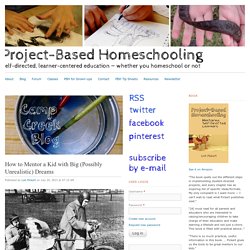
Some of my child’s ideas are down-right unrealistic… (1) Project-Based Homeschooling. What children want vs. what children need. There is a common misconception about what happens when you involve children in their own education: namely, that children will only learn what they want to learn.
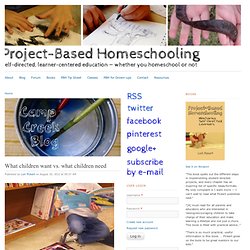
“My child,” they say sourly, “would just [insert useless activity here] all day.” Play with LEGO, play video games, watch TV, read comics — however their child chooses to spend their scant free time, they believe that child will fill whatever extra time they’re given with the same activity: usually something they deem mindless entertainment. Kids whose time is less structured are better able to meet their own goals, says CU-Boulder study. Children who spend more time in less structured activities—from playing outside to reading books to visiting the zoo—are better able to set their own goals and take actions to meet those goals without prodding from adults, according to a new study by the University of Colorado Boulder.
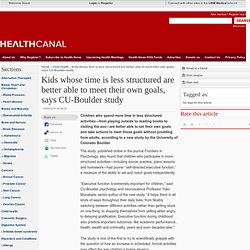
The study, published online in the journal Frontiers in Psychology, also found that children who participate in more structured activities—including soccer practice, piano lessons and homework—had poorer “self-directed executive function,” a measure of the ability to set and reach goals independently. “Executive function is extremely important for children,” said CU-Boulder psychology and neuroscience Professor Yuko Munakata, senior author of the new study. “It helps them in all kinds of ways throughout their daily lives, from flexibly switching between different activities rather than getting stuck on one thing, to stopping themselves from yelling when angry, to delaying gratification. Read the study at. All Work and No Play: Why Your Kids Are More Anxious, Depressed - Esther Entin. For more than fifty years, children's free play time has been continually declining, and it's keeping them from turning into confident adults What are your memories of playing as a child?
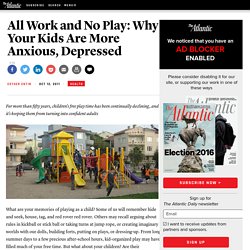
Some of us will remember hide and seek, house, tag, and red rover red rover. Others may recall arguing about rules in kickball or stick ball or taking turns at jump rope, or creating imaginary worlds with our dolls, building forts, putting on plays, or dressing-up. The Drugging of the American Boy. Photos by Sarah Wilmer By Ryan D’Agostino | Originally Published at Esquire Magazine.
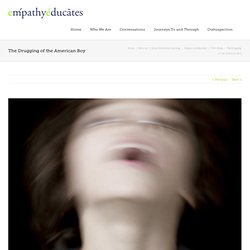
March 27, 2014 | Published in the April 2014 issue By the time they reach high school, nearly 20 percent of all American boys will be diagnosed with ADHD. Millions of those boys will be prescribed a powerful stimulant to “normalize” them. A great many of those boys will suffer serious side effects from those drugs. The shocking truth is that many of those diagnoses are wrong, and that most of those boys are being drugged for no good reason—simply for being boys. UPDATE: A plea to slow down the drugging of the American boy. How will you know if your homeschooling has been a success? - Simple Homeschool. 50 Educational Video Games That Homeschoolers Love. Video games often get a bad rap.
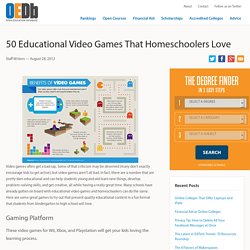
Some of that criticism may be deserved (many don’t exactly encourage kids to get active), but video games aren’t all bad. In fact, there are a number that are pretty darn educational and can help students young and old learn new things, develop problem-solving skills, and get creative, all while having a really great time. Many schools have already gotten on board with educational video games and homeschoolers can do the same.
James Burke : Connections, Episode 1, "The Trigger Effect", 1 of 5 (CC) How I get all my students to be good at math - Quartz. As a mathematics educator for the last seven years, I can attest that most folks believe they either are or are not “math people.”
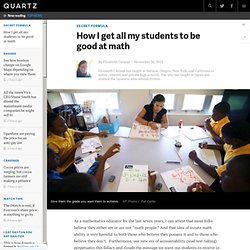
And that idea of innate math ability is very harmful to both those who believe they possess it and to those who believe they don’t. Furthermore, our new era of accountability (read test-taking) perpetuates this fallacy and clouds the message we want our students to receive in math class. Not all the same: Algebra is not the same as geometry There is most certainly no such ability that allows some students to pass algebra and others to fail. This argument is made forcefully and articulately in Noah Smith and Miles Kimball’s recent article in Quartz, so I won’t rehash the point except to say that math draws on a huge range of cognitive processes. Overconfidence is just as harmful How else is the belief harmful? Math can make even the smartest people feel dumb and believing in an intrinsic mathematics ability isolates the stupidity.
Passion-Based Learning for the 21st Century. ‘I’m Not Stupid, Just Dyslexic’ — And How Brain Science Can Help. Sixth-grader Josh Thibeau has been struggling to read for as long as he can remember.
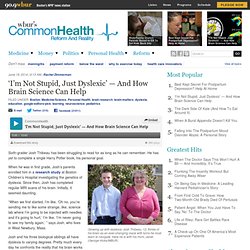
He has yet to complete a single Harry Potter book, his personal goal. Growing up with dyslexia: Josh Thibeau, 12, thinks of his brain as an ever-changing maze with turns he must learn to navigate. Here he is with his mom, Janet. Successful Teen Homeschooling: Two Vital Factors. The teenaged years are actually the most rewarding of the homeschooling years.

That’s what we’ve found with our four homeschooled children. And that’s what I was told by many of the 110 families I interviewed for my book Free Range Learning:: How Homeschooling Changes Everything . People in Ireland, Australia, India, Germany, and the U.S. described coming to this realization in similar ways. Their concerns about helping a young child master the basics or their struggles to find the right homeschooling style gradually resolved. Homeschooling isn’t the cure-all, by any means, for a culture that barely recognizes a young person’s need for identity and meaning. There are a number of pivotal elements in the period we call adolescence. Pursuing interests builds character traits that benefit us for life. In my family, we’ve noticed that interest-based learning builds competence across a whole range of seemingly unrelated fields.